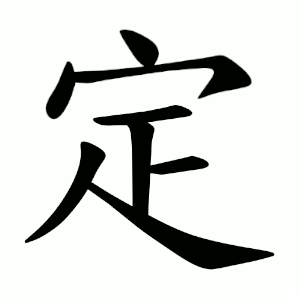定
- to decide;
- to settle;
- to determine;
Etymology
Phono-semantic compound:
宀 (면) – represents a roof or house, symbolizing a place of stability;
正 (정) – phonetic component, provides the sound “정.”
Originally, the character carried the sense of “making something stable and fixed within a space (house)”, which naturally expanded to “to settle,” “to decide.”
Semantic development:
- being settled — fixed, placed properly
- mental decision — determination
- rule or standard — established norm
- stability — calmness, order (related uses)
Usage in Korean
定 is a core character in Korean, Chinese, and Japanese for decisions, settings, and establishing rules.
Common compounds:
결정 (決定) — decision; determine
정책 (政策) — policy (established plan)
정액 (定額) — fixed amount
정해지다 (定하다) — to be decided
확정 (確定) — to finalize; confirm
안정 (安定) — stability
설정 (設定) — setting, configuration
Set phrases:
마음이 정해지다 — one’s mind is made up
정해진 규칙 — fixed rules
Additional notes
Words that derived from 定
- 가정(假定)–assumption; supposition; proposition
- 감정(鑑定)–judgment; expert opinion
- 검정(檢定)–official approval; certification
- 결정(決定)–decision
- 결정되다(決定되다)–be decided
- 국정(國定)–government authorization
- 규정(規定)–regulation; rule; stipulation; definition; determination
- 규정하다(規定하다)–prescribe; stipulate
- 긍정(肯定)–affirmation; acknowledgement
- 내정(內定)–deciding secretly; deciding internally
- 단정(斷定)–conclusion
- 법정(法定)–being legal
- 사정(査定)–assessment; evaluation
- 설정(設定)–set-up
- 안정(安定)–stability; equilibrium
- 안정화(安定化)–stabilization
- 예정(豫定)–plan; expectation
- 인정(認定)–recognition; acknowledgment
- 인정되다(認定되다)–be recognized; be conceded
- 일정(一定)–being fixed; being regular
- 정립(定立)–setting; establishment
- 정설(定說)–standard theory; mainstream theory
- 정원(定員)–capacity; the maximum number of admissions
- 정의(定義)–definition
- 정착(定着)–settlement; taking root
- 정착되다(定着되다)–be settled; take root
- 정처(定處)–aim
- 제정(制定)–enactment; designation
- 지정(指定)–designation
- 十一卜人 (JMYO)
- ⿱ 宀 𤴓
